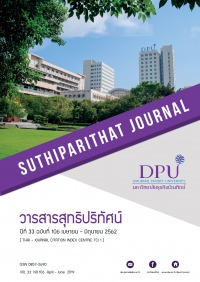การศึกษาเปรียบเทียบตัวแบบผู้นำเชิงจริยธรรมของผู้ประกอบการฐานชุมชน: การใช้ตัวแบบสมการโครงสร้างในจังหวัดร้อยเอ็ดและเพชรบูรณ์
คำสำคัญ:
ผู้นำเชิงจริยธรรม, ผู้ประกอบการฐานชุมชน, ตัวแบบสมการโครงสร้างบทคัดย่อ
การวิจัยครั้งนี้มีวัตถุประสงค์เพื่อ (1) ศึกษาตัวแบบสมการโครงสร้างของผู้นำเชิงจริยธรรมในผู้ประกอบการฐานชุมชนที่เข้าร่วมกับโครงการของรัฐบาล “ธงฟ้าประชารัฐ” ในจังหวัดร้อยเอ็ดและจังหวัดเพชรบูรณ์ และ (2) ศึกษาเปรียบเทียบตัวแบบสมการโครงสร้างของผู้ประกอบการฐานชุมชนระหว่างจังหวัดร้อยเอ็ดและจังหวัดเพชรบูรณ์ งานวิจัยเป็นวิจัยเชิงปริมาณที่ใช้แบบสอบถามในการเก็บข้อมูลจากผู้ประกอบการชุมชนที่เข้าร่วมกับโครงการธงฟ้าประชารัฐของพาณิชย์จังหวัดในจังหวัดร้อยเอ็ดและจังหวัดเพชรบูรณ์ จำนวน 300 และ 190 ราย ตามลำดับ ผู้วิจัยทำการวิเคราะห์โดยใช้สถิติเชิงพรรณนาและใช้การวิเคราะห์ตัวแบบสมการโครงสร้างด้วยวิธี Partial Least Squares-SEM ผลการวิจัยพบว่า (1) ผู้ตอบแบบสอบถามกลุ่มใหญ่ มีอายุมากกว่า 36 ปี และ การศึกษาต่ำกว่าปริญญาตรีเป็นส่วนมาก ทั้งสองจังหวัดเหมือนกัน (2) อายุของกิจการจากสองจังหวัดมีความแตกต่างกัน โดยจังหวัดร้อยเอ็ด กิจการของผู้ประกอบการกลุ่มใหญ่มีอายุไม่เกิน 5 ปี ส่วนกิจการกลุ่มใหญ่ในจังหวัดเพชรบูรณ์มีอายุระหว่าง 6-15 ปี (3) ตัวแบบทั้งสองจังหวัดมีความเหมือนกันในระดับที่สูง (4) ทุกเส้นทางความสัมพันธ์ระหว่างคู่ตัวแปรของทั้งสองตัวแบบมีความสัมพันธ์อย่างมีนัยสำคัญ และ (5) ปัจจัยสำคัญที่สามารถอธิบายผู้นำเชิงจริยธรรมได้มี 3 ปัจจัย ได้แก่ เครือข่ายความสัมพันธ์ ความรับผิดชอบต่อสังคม และความคำนึงถึงสิ่งแวดล้อม งานวิจัยพบว่า ตัวแบบจังหวัดร้อยเอ็ด มีค่าสัมประสิทธิ์ในการตัดสินใจอยู่ที่ร้อยละ 76.3 ส่วนตัวแบบจังหวัดเพชรบูรณ์ มีค่าอยู่ที่ร้อยละ 63.3 ผลวิจัยสรุปว่า ตัวแบบสมการโครงสร้างของทั้งสองจังหวัดสามารถนำไปใช้ประโยชน์ในเรื่องผู้นำเชิงจริยธรรมได้ โดยเน้นการพัฒนาเครือข่ายความสัมพันธ์ ความรับผิดชอบทางสังคม และความคำนึงถึงสิ่งแวดล้อม
เอกสารอ้างอิง
Amisano, D. (2017). The relationship between ethical leadership and sustainability in small businesses (Doctoral dissertation). Minnesota: Walden University. (UMI No. 3510938)
Boiral, O., Baron, C., & Gunnlaugson, O. (2014). Environmental leadership and consciousness development: A case study among Canadian SMEs. Journal of Business Ethics, 123(3), 363-383.
Cochran, W. G. (1977). Sampling techniques. New York: John Willey and Sons.
Dion, M. (2012). Are ethical theories relevant for ethical leadership? Leadership & Organization Development Journal, 33(1), 4-24.
Engelbrecht, A. S., Heine, G., & Mahembe, B. (2017). Integrity, ethical leadership, trust and work engagement. Leadership & Organization Development Journal, 38(3), 368-379.
Gao, Y. & He, W. (2017). Corporate social responsibility and employee organizational citizenship behavior: The pivotal roles of ethical leadership and organizational justice. Management Decision, 55(2), 294-309.
Ginting, G. (2016). Modeling business responsibility of SMEs: A study based on the stakeholder approach. Pertamina Journal of Social Science and Humanities, 24(3), 1043-1056.
Hair, J. F., Hult, G. T. M, Ringle, C. M., & Sarstedt, M. (2017). A primer on partial least squares structural equation modeling (PLS-SEM) (2nd ed.). California: SAGE Publications.
Harris, C. L. (2005). Collaboration for organization success: Linking organization support of collaboration and organization effectiveness (Doctoral dissertation). Texas: University of North Texas. (UMI No. 3206087)
Henseler, J. (2017). Partial least squares path modeling. In P.S.H. Leeflang et al. (Eds.). Advances methods of modeling markets (pp. 361-381). Springer International Publishing.
Madueno, J. H., Jorge, M. L., Conesa, I. M., & Martinez-Martinez, D. (2016). The relationship between corporate social responsibility and competitive performance in Spanish SMEs: Empirical evidence from a stakeholders’ perspective. Business Research Quarterly, 19, 55-72.
Martinez-Martinez, D., Jesus, H. M., Jorge, M. L., & Sancho, M. P. L. (2017). The strategic nature of corporate social responsibility in SMEs: A multiple mediator analysis. Industrial Management & Data Systems, 117(1), 2-31.
Mihelic, K. K., Lipicnik, B., & Tekavcic, M. (2010). Ethical leadership. International Journal of Management & Information Systems, 14(5), 31-42.
Othman, Z., & Rahman, R. A. (2014). Attributes of ethical leadership in leading good governance. International Journal of Business and Society, 15(2), 359-372.
Priyankara, H. P. R., Luo, F., Saeed, A., Nubuor, S. A., & Jayasuriya, P. F. (2018). How does leaders’ support for environment promote organizational citizenship behavior for environment? A multi-theory perspective. Sustainability, 10, 1-20.
Shareef, R. A., & Atan, T. (2019). The influence of ethical leadership on academic employees’ organizational citizenship behavior and turnover intention: Mediating role of intrinsic motivation. Management Decision, 57(3), 583-605.
Zheng, Q., Wang, M., & Li, Z. (2011). Rethinking ethical leadership, social capital and customer relationship. Journal of Management Development, 30(7/8), 663-674.
ดาวน์โหลด
เผยแพร่แล้ว
รูปแบบการอ้างอิง
ฉบับ
ประเภทบทความ
สัญญาอนุญาต
เนื้อหาและข้อมูลในบทความที่ลงตีพิมพ์ในวารสารสุทธิปริทัศน์ ถือเป็นข้อคิดเห็นและความรับผิดชอบของผู้เขียนบทความโดยตรงซึ่งกองบรรณาธิการวารสาร ไม่จำเป็นต้องเห็นด้วย หรือร่วมรับผิดชอบใด ๆ
บทความ ข้อมูล เนื้อหา รูปภาพ ฯลฯ ที่ได้รับการตีพิมพ์ในวารสารสุทธิปริทัศน์ ถือเป็นลิขสิทธิ์ของวารสารสุทธิปริทัศน์หากบุคคลหรือหน่วยงานใดต้องการนำทั้งหมดหรือส่วนหนึ่งส่วนใดไปเผยแพร่ต่อหรือเพื่อกระทำการใด ๆ จะต้องได้รับอนุญาตเป็นลายลักษณ์อักษรจากวารสารสุทธิปริทัศน์ก่อนเท่านั้น







